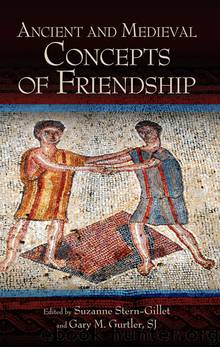Ancient and Medieval Concepts of Friendship by Gurtler Gary M. Stern-Gillet Suzanne

Author:Gurtler, Gary M.,Stern-Gillet, Suzanne
Language: eng
Format: epub
Publisher: State University of New York Press
Published: 2014-01-02T16:00:00+00:00
Love as Abundance
The most important question is simply in what sense we may be said to need or desire another. For Aristophanes, the loved one was once near and close at hand, but is now lacking. For Socrates, the other may possess something that we presently possess in some measure, but that we seek to secure for the future. But it must be proposed that if the Stoics have an intellectual forebearer it is neither Socrates nor Aristophanes; it is Agathon, or rather Agathon before he is compelled by Socrates to admit that the desirer “must have desire for what it lacks, and again, have no desire if he has no lack” (Sym. 200b2).
The Stoics believe what Socrates forces Agathon to deny, that the strong have a desire for the strong, the virtuous for the virtuous. They assert that, while we all desire virtue, those who are most virtuous most eagerly put themselves at the service of another and give of themselves in a way that manifests true love. This is what is meant by describing love as neither the offspring of poverty nor want, but of abundance and self-sufficiency. For Cicero, those who are most abundant in virtue and those who find the most resources for it in themselves are those most capable of true love.
But lest this self-sufficiency, which is at the root of love, be taken for what it is not, we must distinguish it from emotional distance. Cicero is absolutely clear that we cannot root out from our hearts the humanitas that binds us to other people. Even though emotional ties can sometimes become strained in a way that causes emotional upset, that pain we feel as a result “has no more power to banish friendship from life than it has to cause us to reject certain cares and annoyances” (xiii.48). “For,” as he argues, “it is inconsistent not to undertake any honorable business or course of conduct, or to lay it aside when undertaken, in order to avoid anxiety. Nay, if we continually flee from trouble, we must also flee from virtue, who necessarily meets with some trouble in rejecting and loathing things contrary to herself” (xiii.47). Thus, he says that “if we flee care and worry, then virtue too is to be fled” (si curam fugimus, virtus fugienda est: xiii.47).
In Laelius we find an example of this self-sufficiency. We have in him a man who “finds all his belongings in himself” and who therefore finds complete contentment in exercising his own virtue. Able to exercise his virtue contentedly and without being distracted by externals or the pull they exert upon him, he is able to continue in that direction without interference from exterior events. Laelius’ ties to Scipio were strengthened through their exchange of favors given and received. Indeed, this is how each came to regard the other, not just as a part of his life, but a part of himself with whom his own well-being became intertwined. Of course, the ties binding them
Download
This site does not store any files on its server. We only index and link to content provided by other sites. Please contact the content providers to delete copyright contents if any and email us, we'll remove relevant links or contents immediately.
The remains of the day by Kazuo Ishiguro(8977)
Tools of Titans by Timothy Ferriss(8368)
Giovanni's Room by James Baldwin(7330)
The Black Swan by Nassim Nicholas Taleb(7109)
Inner Engineering: A Yogi's Guide to Joy by Sadhguru(6785)
The Way of Zen by Alan W. Watts(6601)
Asking the Right Questions: A Guide to Critical Thinking by M. Neil Browne & Stuart M. Keeley(5759)
The Power of Now: A Guide to Spiritual Enlightenment by Eckhart Tolle(5757)
The Six Wives Of Henry VIII (WOMEN IN HISTORY) by Fraser Antonia(5501)
Astrophysics for People in a Hurry by Neil DeGrasse Tyson(5182)
Housekeeping by Marilynne Robinson(4436)
12 Rules for Life by Jordan B. Peterson(4299)
Double Down (Diary of a Wimpy Kid Book 11) by Jeff Kinney(4261)
Ikigai by Héctor García & Francesc Miralles(4247)
The Ethical Slut by Janet W. Hardy(4242)
Skin in the Game by Nassim Nicholas Taleb(4239)
The Art of Happiness by The Dalai Lama(4125)
Skin in the Game: Hidden Asymmetries in Daily Life by Nassim Nicholas Taleb(3991)
Walking by Henry David Thoreau(3953)
